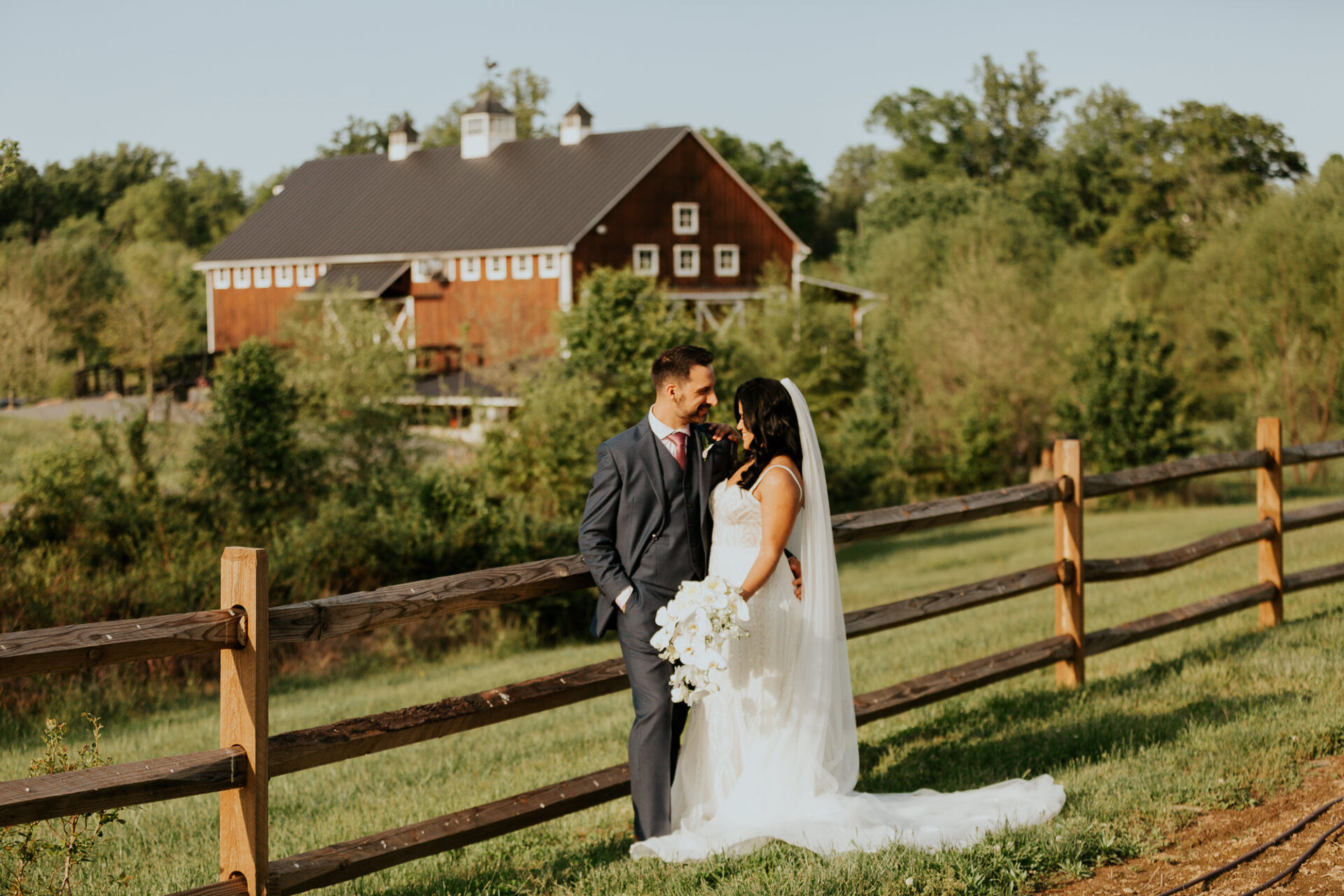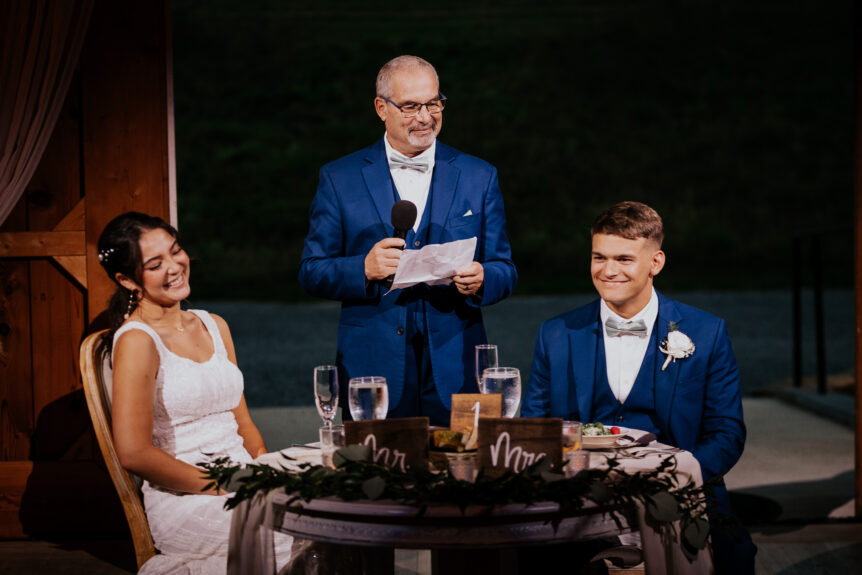By Terry Meadows
Table of Contents
4-minute read
Our Favorites
Ever wondered who stands up to speak at a wedding and when?
Puzzled about how to craft a speech that captures hearts without dragging on?
With over 15 years of experience in the wedding industry, we at Zion Springs have been privileged to guide countless couples through their wedding planning journey. We're passionate about leveraging our extensive knowledge to educate and empower couples on their wedding journey, ensuring each step is informed and inspired by seasoned expertise to make your day truly exceptional.
In this article, we'll unravel the mysteries of wedding speeches, from who traditionally takes the microphone to the optimal timing that keeps guests engaged and entertained. We help you determine the perfect length for speeches and the ideal number of orations to ensure your celebration flows seamlessly with practical tips and suggestions.
Introduction to Wedding Speeches
Wedding speeches are a cherished tradition, rich in history, and filled with emotion. Far from just formalities, they are pivotal moments that capture love, laughter, and lasting memories. Envision a father sharing tender stories of his daughter's youth or a best man blending humor with warmth to honor a deep friendship. These irreplaceable moments highlight the true value of wedding speeches, making them a key element of the celebration.
The Essence and Importance of Speeches in Wedding Celebrations
Wedding speeches link the past to the present, weaving individual stories into a shared narrative. They reveal intimate tales and aspirations that define the couple. From the maid of honor recounting cherished memories to the couple's own expressions of thanks and hope, each speech enriches the celebration, touching the hearts of everyone gathered.
Understanding the Flow of the Day
The placement of speeches within the wedding day's timeline is about timing and tact. Traditionally scheduled between courses of the wedding feast or as a preamble to the evening's festivities, the speeches serve as both a transition and a highlight. The key is balance; timing speeches to complement the day's rhythm without interrupting the flow of celebration. Imagine speeches as interludes, moments of reflection and joy that punctuate the day, offering guests a chance to savor the words and the meal with equal relish.
We'll now explore how to seamlessly weave these meaningful expressions into the day's schedule, focusing on the optimal moment for speeches—before or after the meal.
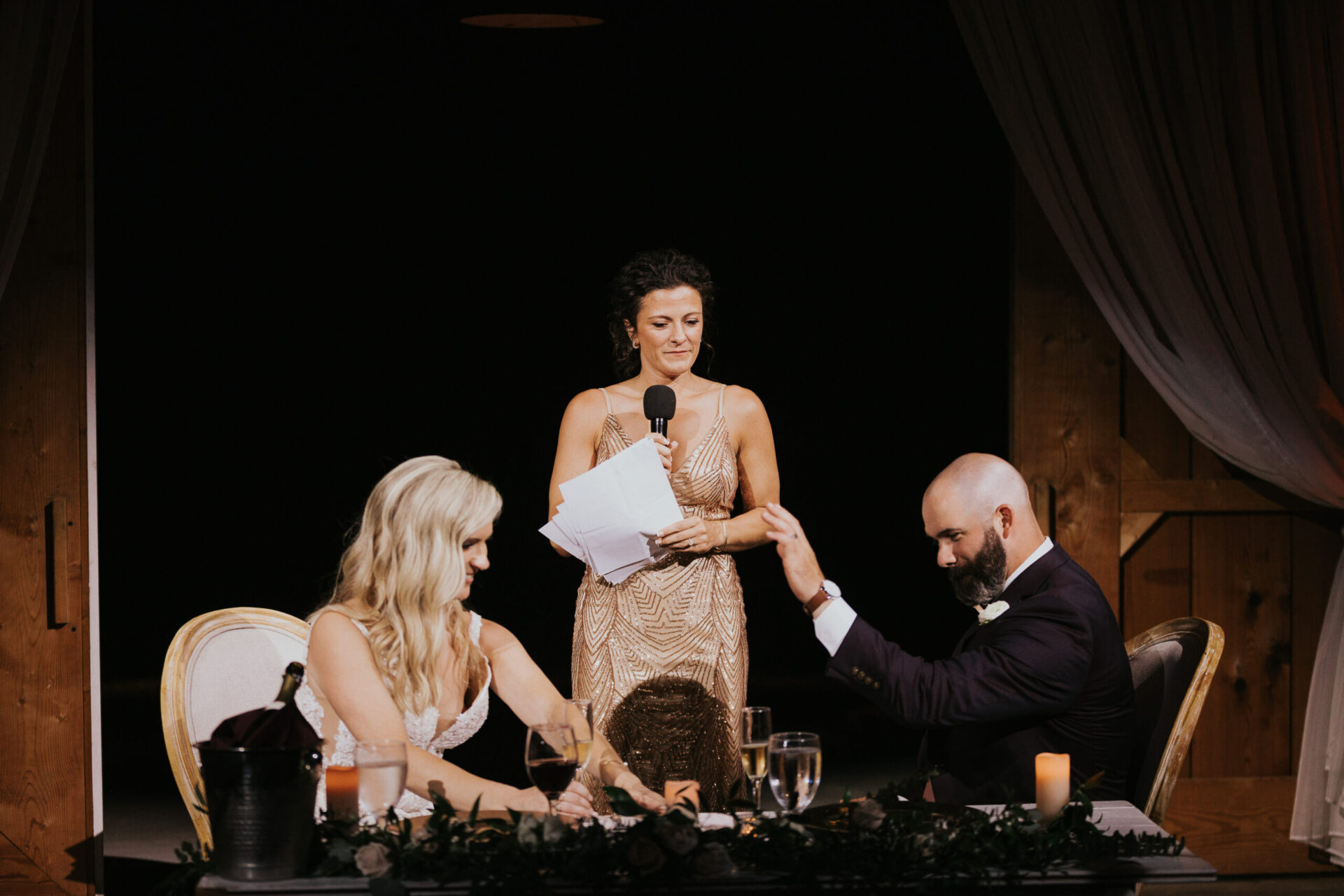
Who Gives Speeches at Weddings?
When it comes to wedding speeches, tradition has paved the way, but modern trends are setting new paths. Understanding who speaks and in what order can add a layer of personalization and meaning to your special day.
Traditional and Contemporary Perspectives
Traditionally, a specific set of individuals are expected to deliver speeches. The father of the bride typically kicks off, offering blessings and sharing memories. Following him, the groom takes the stage, expressing his gratitude and love, and the best man concludes with a mix of humor and sentimentality, often sharing amusing anecdotes about the groom.
However, contemporary weddings are breaking the mold, incorporating a more inclusive and diverse lineup. It's becoming increasingly common for the bride to speak, offering her perspective and thanks. Maid of honor speeches are also a staple, mirroring the best man's role but from the bride's side. Some couples even invite close friends, siblings, or extended family members to share their thoughts, making the occasion even more personal and inclusive.
The Typical Order of Wedding Speeches
The conventional order typically starts with the father of the bride, followed by the groom, and then the best man. This sequence ensures a smooth transition from heartfelt to light-hearted moments. The order can be flexible in modern settings, with speeches interspersed throughout the evening or clustered together for impact.
For example, after the father of the bride's speech, you might have the bride or maid of honor speak, adding variety and balancing the perspectives shared. Some couples opt for a break between speeches, allowing guests to reflect and enjoy the moment before transitioning to the next speaker.
As we explore the evolving landscape of wedding speeches, remember that there's no one-size-fits-all approach. The next section looks at timing your speeches.
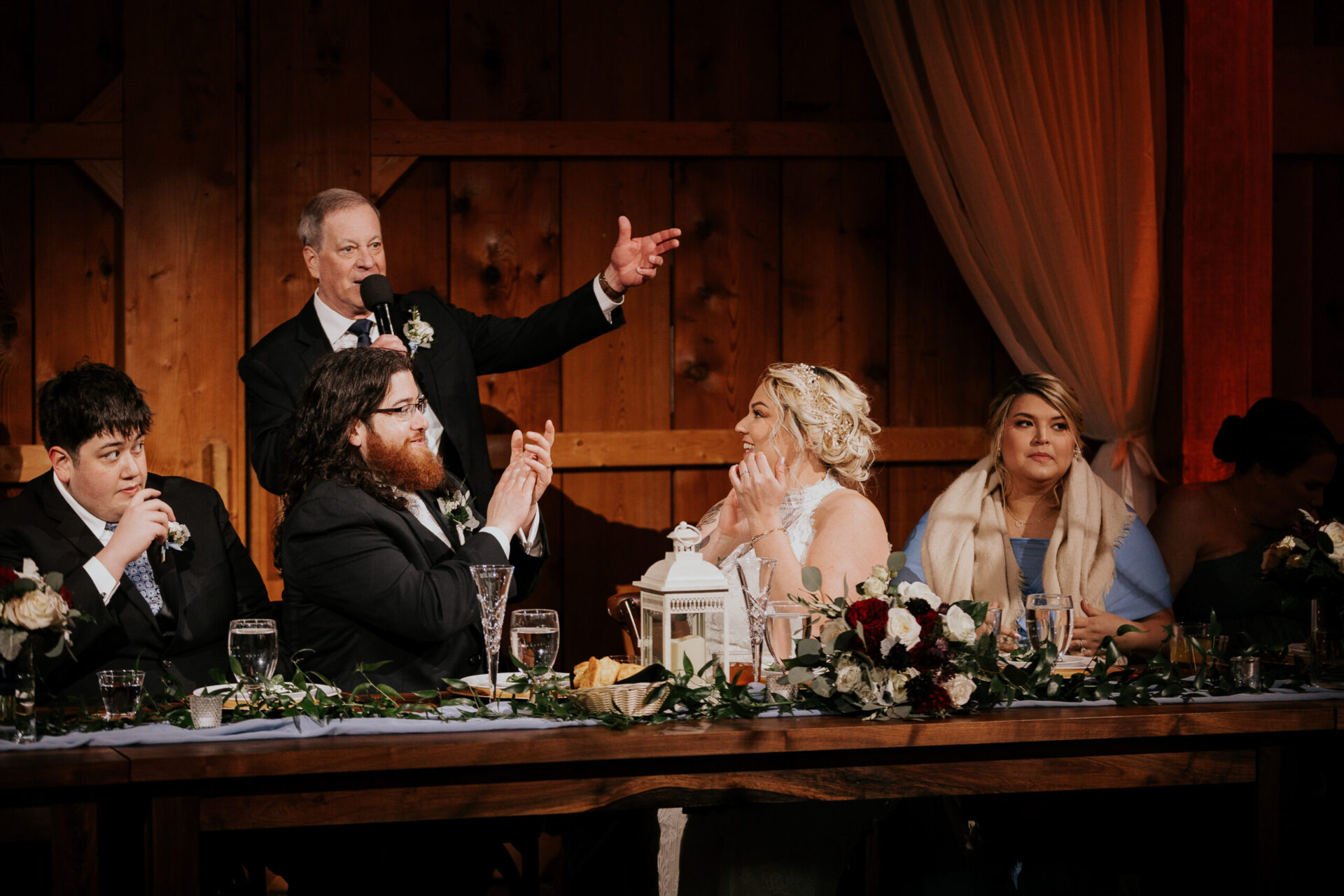
Timing Your Wedding Speeches Perfectly
Nailing the timing of wedding speeches maintains the day's flow and ensures your guests are engaged. Whether speeches should precede or follow the meal is more than just a matter of scheduling—it sets the tone for the entire celebration.
Before or After the Meal?
Opting for speeches before the meal can capture your guests at their most attentive, with the anticipation of the feast adding a sense of excitement. This approach also allows speakers to enjoy their meal without the nerves of an impending speech. However, it might mean a longer wait for food, which could be a downside for some.
Conversely, holding speeches after the meal can benefit from a more relaxed audience, well-fed and perhaps more receptive to humor and emotion. Yet, this timing runs the risk of speeches being met with a less attentive crowd, as the satisfaction of a good meal can lead to a lull in energy.
Factors Influencing the Timing of Speeches
The structure of the meal itself plays a significant role in deciding the timing. For instance, a buffet-style meal might offer more flexibility, allowing speeches to be interspersed throughout the evening. In contrast, a plated dinner might necessitate a more structured approach, with speeches either opening or concluding the dining experience.
Venue rules can also dictate the flow of the evening. Some venues may have strict timelines for meal service, which could limit your options for speech timing. Additionally, cultural traditions often play a pivotal role. In some cultures, speeches are an integral part of the meal, with toasts and responses woven throughout the courses.
When timed well, speeches can be a standout feature of the celebration, so it's important to craft them thoughtfully for maximum impact and memorability.
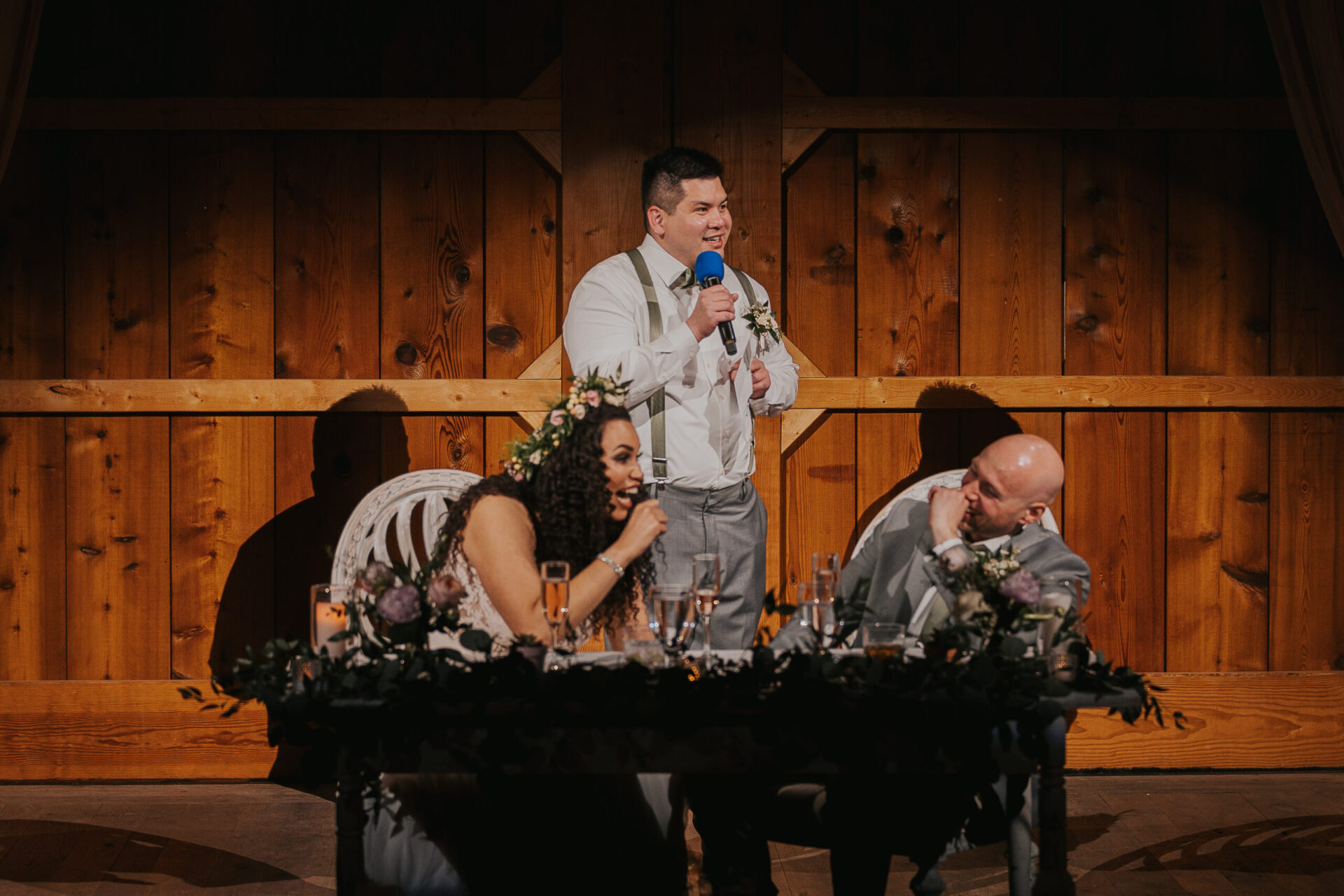
Crafting the Perfect Wedding Speech
Creating a memorable wedding speech is an art that balances brevity with depth, ensuring each word holds weight and captivates the audience.
The Ideal Length of a Wedding Speech
The golden rule for wedding speeches is to keep them short and sweet. Ideally, speeches should last between 3 to 5 minutes. This timeframe is sufficient to convey heartfelt messages without losing the audience's attention. For example, the father of the bride might share a concise anecdote that encapsulates his emotions, while the best man could recount a brief, humorous story that highlights his bond with the groom.
Tips for Keeping Speeches Concise and Impactful
- Start with a Strong Opening: Grab your audience's attention with a compelling opening line. It could be a quote, a brief anecdote, or a humorous observation that ties into the heart of your speech.
- Focus on Key Messages: Identify the core messages you want to convey. Whether it's expressing gratitude, sharing memories, or offering well-wishes, center your speech around these pillars to maintain clarity and purpose.
- Use Stories Sparingly: A well-chosen story can be powerful, but resist the urge to pack multiple anecdotes into one speech. Select one that best illustrates your relationship with the bride or groom and aligns with your message.
- Practice and Time Yourself: Rehearse your speech to ensure it fits within the desired timeframe. Adjust as necessary, trimming any parts that feel superfluous or adding detail to sections that warrant it.
As we master the craft of delivering concise yet meaningful speeches, we pave the way for a seamless transition into understanding the dynamics of balancing the number of speeches to maintain the celebration's momentum.
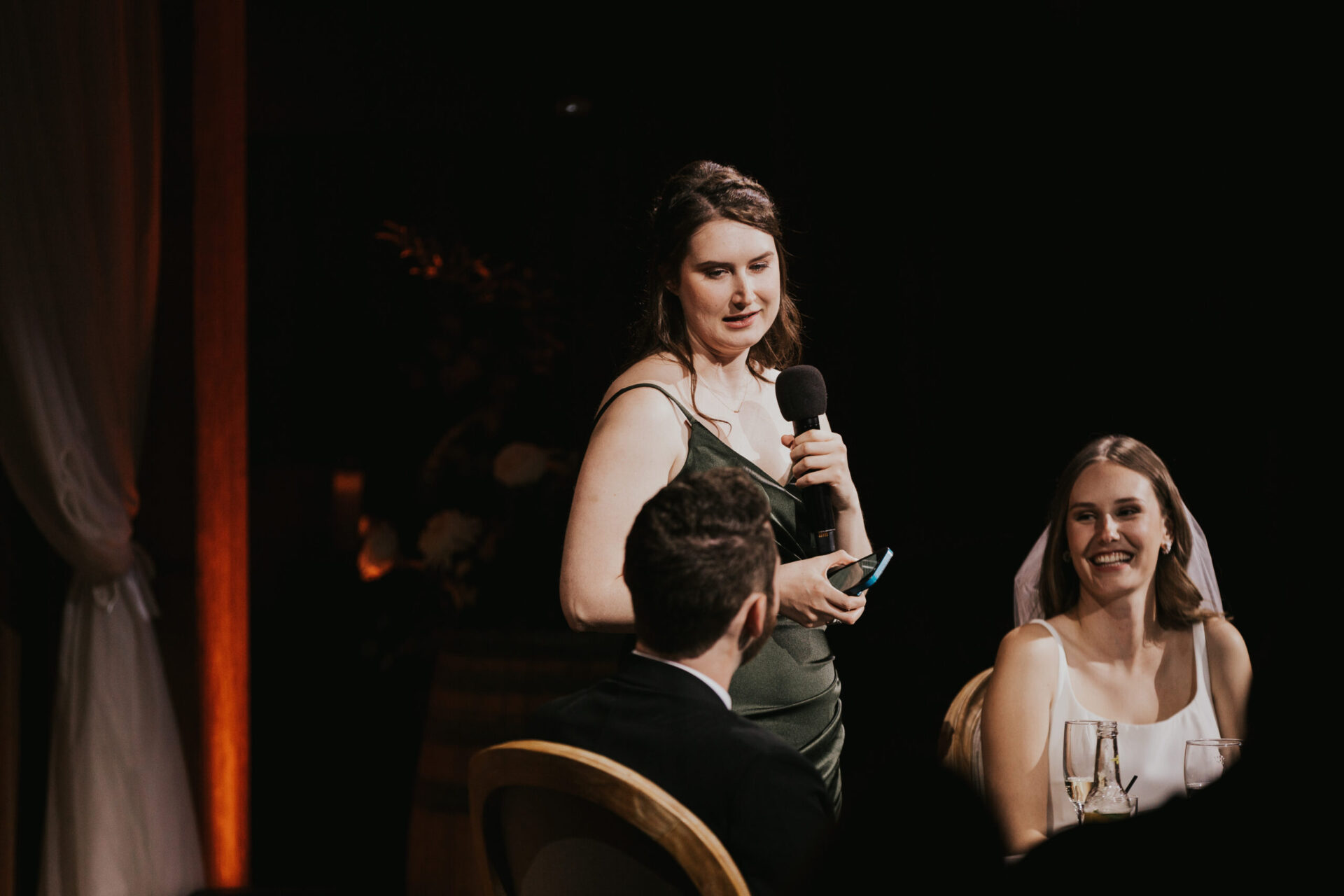
Balancing the Number of Wedding Speeches
Finding the sweet spot in the number of wedding speeches is key to keeping the event's energy alive and ensuring guests remain engaged.
How Many Speeches Are Just Right?
The typical wedding features three to four speeches, including those from the father of the bride, the groom, the best man, and, optionally, the maid of honor. However, the "right" number can vary depending on the wedding's size and style. A smaller, intimate gathering might benefit from fewer, more personal speeches, while a larger event could accommodate a broader range of voices without losing momentum.
For instance, in a cozy family wedding, having the couple share a joint speech could add a uniquely personal touch, while in a grand celebration, inviting a close friend or sibling to speak might enrich the narrative tapestry of the evening.
Ensuring a Smooth Flow
To maintain the wedding's flow and prevent speech fatigue, consider these strategies:
- Spread Out the Speeches: Instead of clustering all speeches together, intersperse them throughout the evening, perhaps between courses or key events, to keep the energy varied and fresh.
- Set Clear Time Limits: Inform speakers of their allotted time well in advance, encouraging them to craft their messages to fit. This helps avoid overly long speeches that could dampen the event's spirit.
- Vary the Tone: Balance emotional speeches with lighter ones. Following a heartfelt father-of-the-bride speech with the best man's humor can keep the mood buoyant and varied.
- Prep for Transitions: Plan smooth transitions between speeches and other segments of the evening, such as music or performances, to maintain a dynamic and engaging atmosphere.
By carefully selecting and timing speeches, each can stand out, enriching the celebration. Next, we'll wrap up our guide, weaving together all aspects to create an unforgettable wedding experience.
Bringing It All Together for Effective Wedding Speeches
In your quest to master the art of wedding speeches, you've journeyed through the traditions, timings, and techniques that make these moments truly special. From understanding who takes the stage and in what order, to finessing the perfect balance of heartfelt and humorous words, this article has guided you through creating speeches that resonate and remain memorable.
At Zion Springs, our extensive experience in the wedding industry fuels our passion for sharing insights that enrich your wedding planning journey. We believe that well-crafted speeches are a cornerstone of the celebration.
For those eager to dive deeper into wedding planning wisdom, we invite you to explore our comprehensive guide on "How to Plan the Perfect Wedding Rehearsal." Additionally, our Answers and Advice web page is a treasure trove of educational articles designed to support you at every step of your wedding journey.
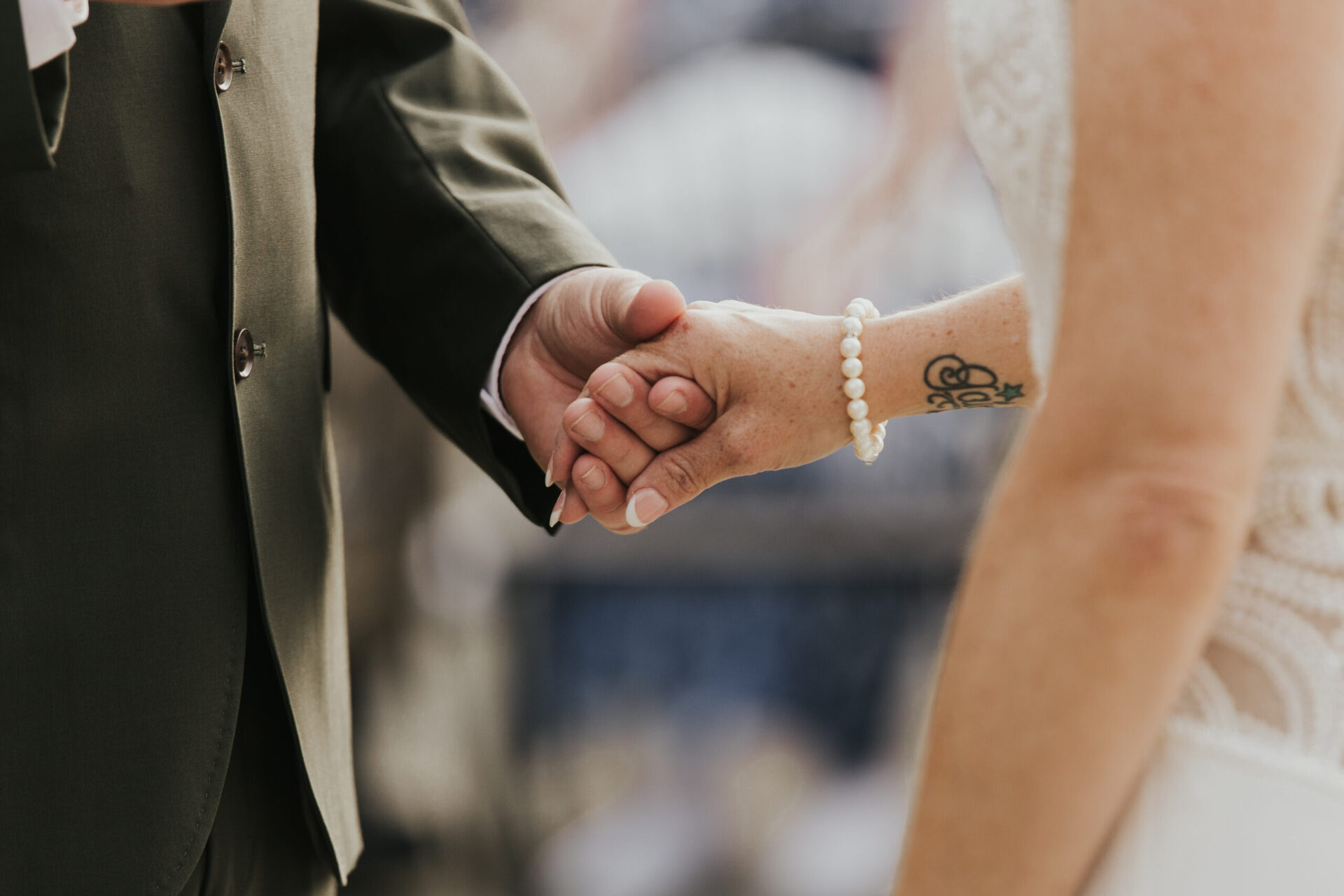
Best Waterfront Wedding Venues in Virginia: Your Guide to the Perfect “I Do”
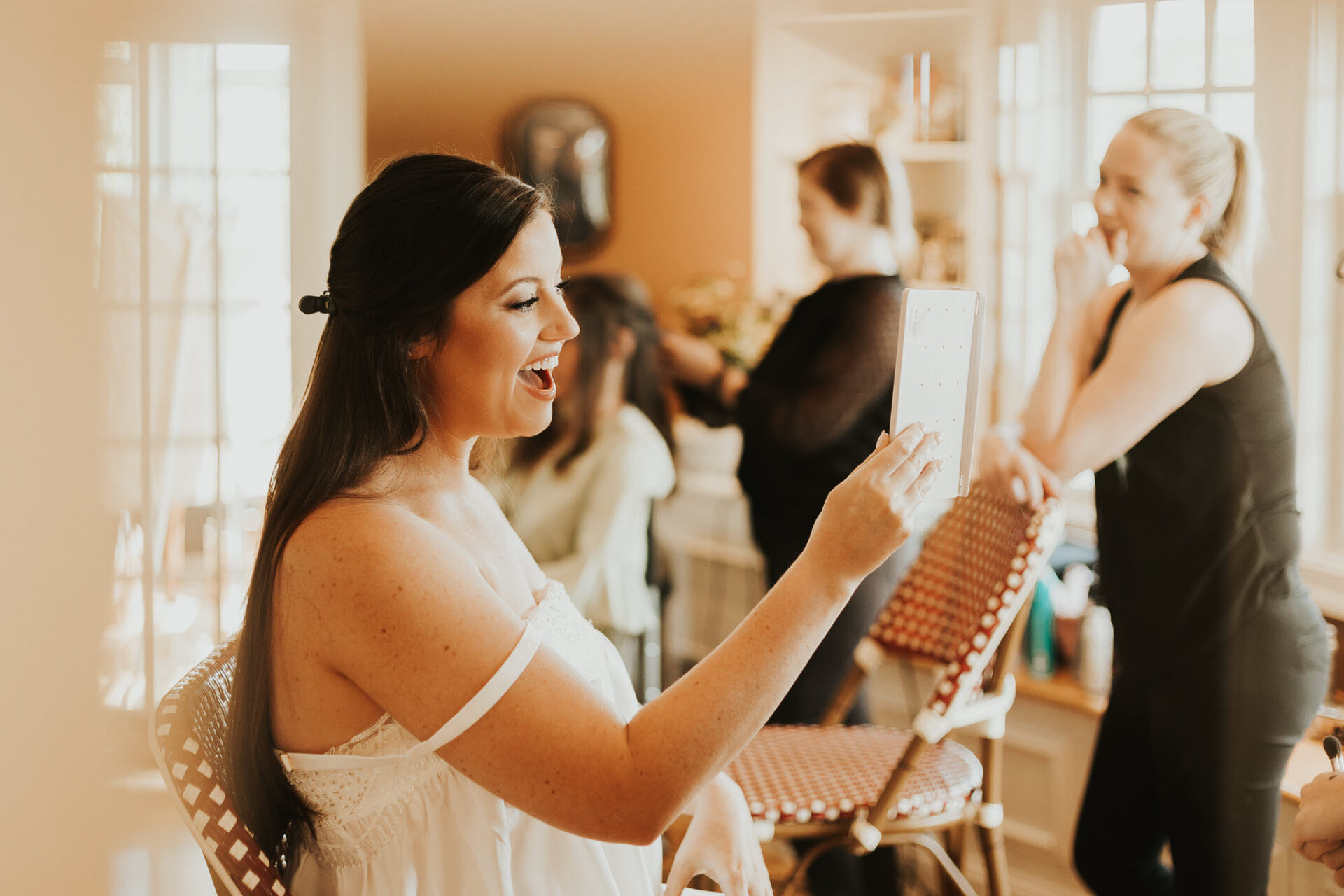
Zion Springs Bridal Suites: Elevate Your Wedding Day Experience
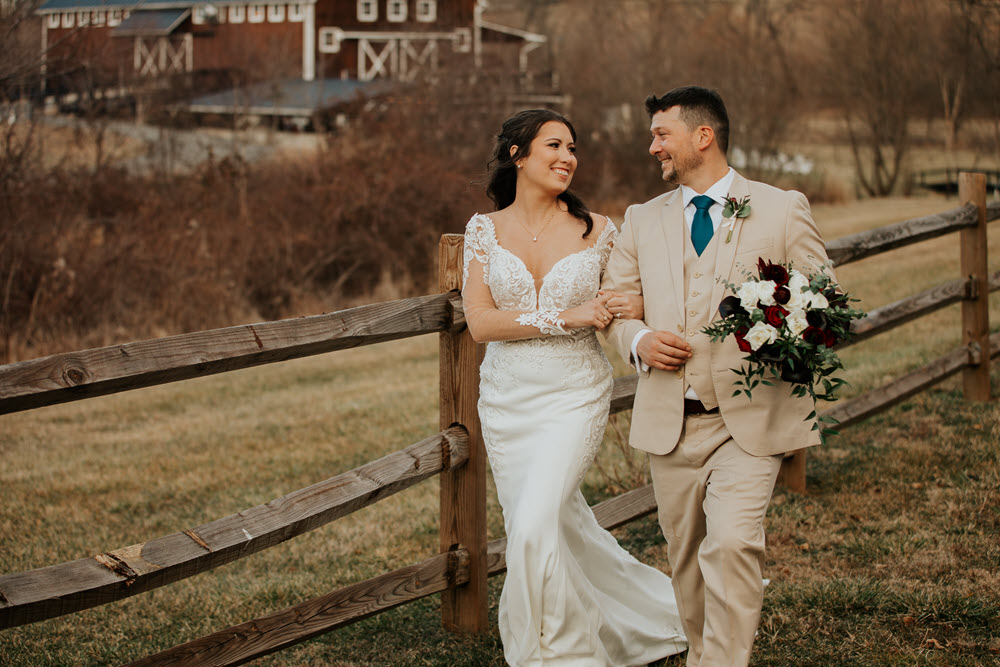
Modern Wedding Trends Every Couple Should Consider
